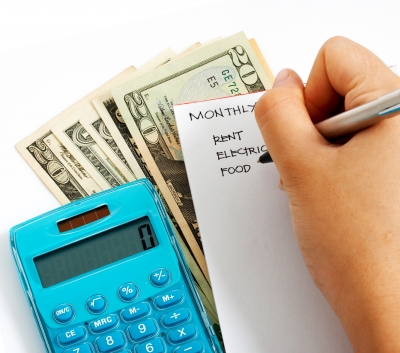The word “budget” doesn’t usually excite most people. In fact, many think of budgets as restrictive. Or they may think of spreadsheets, complicated equations or time consuming number crunching. The good news is that a good budget doesn’t have to involve any of those things. Well, a good budget may be a little restrictive – but only in the sense that you’ll only spend money you actually have and you’ll have a good idea of where your money is going.
If you’d rather relax during your time off than balance complicated personal accounts, keep reading for an easy, 3-step budget that will put you on the road to better financial health.
Total Your Bills
How much does your life cost each month? Take out a sheet of paper and list the regular bills you pay each month and the amounts (e.g. rent/mortgage, utilities, cable, phone, debt repayment, etc.). Then write down all of the irregular bills you pay quarterly or annually and the total amounts for each (e.g. car registration, car insurance, taxes, etc.). Now add both your regular and irregular bill totals together for a grand total and divide that total by the number of paychecks you receive each year. For instance, if you get paid once a month, divide your total by 12. This is the amount you need to set aside from each paycheck and deposit into your bills account (more information below).
Keep Things Separate
Now that you have a handle on the amount of your bills, the next step is to open separate bank accounts for all of your various needs. A good place to start is with three accounts: An operating account, a bills account and a savings account. Here’s the purpose of each account:
Bills: This is the account you’ll use to hold money for your regular and irregular bills that you totaled on a piece of paper (see, no spreadsheets required). Deposit this amount each pay day into this account so that you are confident that you’ll always have money to pay your rent, utilities, annual car registration, etc.
Savings: This is where you’ll save money for an emergency fund, travel or anything else that you need to set money aside for. You may choose to have more than one savings account to keep track of each goal separately.
Operating: Need cash from the ATM? It comes from this account. Buying concert tickets? Purchase them from this account. Basically funds in this account are free for you to spend because you’ve already allocated funds to cover your bills and any savings.
You can have your pay check direct deposited to your operating account and then simply transfer the amount you need to set aside into your bills account each pay period.
Be sure to shop around for banks that don’t charge fees for these various accounts. You want to utilize free checking and/or savings accounts so that money isn’t flying out the door each month in fee charges.
Spend
The remaining funds can be used at your discretion for groceries, entertainment, hobbies, etc.
Feel free to tailor this budget plan to fit your needs. You may want to include things like car repairs, gas and groceries as part of your bills account and save for them out of each paycheck. You can make this plan work for you and your budget. The most important things is that you are planning for each area of your life – the necessities and the fun stuff, and you that you have a pretty good handle on how much money each area costs.
Image credit: Stuart Miles/freedigitalphotos.net
Denene Brox is a Kansas City-based freelance writer. Visit her online at www.earnmorelivewell.blogspot.com.
- Retirement Planning for Nurses - July 17, 2019
- How to Combat Nurse Burnout - April 9, 2019
- Are For-Profit Nursing Schools a Good Choice? - October 16, 2018



